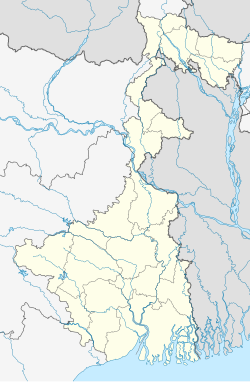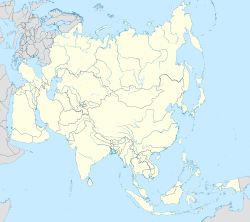Banarhat is a census town of the Banarhat CD block in Dhupguri subdivision of the Jalpaiguri District in the state of West Bengal, India. Sharing nearest international border with BHUTAN.
Banarhat | |
|---|---|
Census Town | |
| Coordinates: 26°47′17″N 89°02′27″E / 26.78814°N 89.0408°E | |
| Country | |
| State | West Bengal |
| District | Jalpaiguri |
| Block | Banarhat |
| Elevation | 161 m (528 ft) |
| Population (2011) | |
| • Total | 15,642 |
| Languages | |
| • Official | Bengali, English[1][2] |
| Time zone | UTC+5:30 (IST) |
| PIN | 735202 |
| Telephone code | 03563 |
| Vehicle registration | WB |
| Lok Sabha constituency | Jalpaiguri (SC) |
| Vidhan Sabha constituency | Dhupguri (SC) |
| Website | jalpaiguri |
Geography
edit10miles
River
Wildlife
Sanctuary
National
Park
checkpoint
CT: census town, R: rural/ urban centre, N: neighbourhood, C: cantonment, NP: national park/ wildlife sanctuary, TE: tea estate
Abbreviations used in names – TG for Tea Garden (town/village), TE for Tea Estate, JRS: junction railway station
Owing to space constraints in the small map, the actual locations in a larger map may vary slightly
Area overview
editThe map alongside shows the alluvial floodplains south of the outer foothills of the Himalayas. The area is mostly flat, except for low hills in the northern portions.[3][4] It is a primarily rural area with 62.01% of the population living in rural areas and a moderate 37.99% living in the urban areas.[5][6] Tea gardens in the Dooars and Terai regions produce 226 million kg or over a quarter of India's total tea crop.[7][8] Some tea gardens were identified in the 2011 census as census towns or villages.[9] Such places are marked in the map as CT (census town) or R (rural/ urban centre). Specific tea estate pages are marked TE.
Note: The map alongside presents some of the notable locations in the subdivision. All places marked in the map are linked in the larger full screen map.
Gram panchayats
editGram panchayats surrounding Banarhat Town are: Banarhat I,[10] Banarhat II,[11] Chamurchi,[12] and Binnaguri.[13]
Civic administration
editPolice station
editBanarhat police has jurisdiction over Banarhat CD block and parts of Dhupguri & Nagrakata CD blocks.[14][15]
Demographics
editAccording to the 2011 Census of India, Banarhat had a total population of 15,642 of which 7,965 (51%) were males and 7,687 (49%) were females. There were 1,759 persons in the age range of 0 to 6 years. The total number of literate people in Banarhat was 10,298 (74.12% of the population over 6 years).[16]
As of 2001[update] India census,[17] Banarhat Town had a population of 14,431. Males constitute 52% of the population and females 48%. Banarhat has an average literacy rate of 55%, lower than the national average of 59.5%; with 59% of the males and 41% of females literate. 14% of the population is under 6 years of age.
Transport
editBanarhat is connected by State road to the district city of Jalpaiguri and other nearby towns of Dhupguri, Gairkata, Mainaguri, etc. It lies on National Highway 31C, which crosses the Teesta river at the Coronation Bridge, Siliguri, Oodlabari, Malbazar, Birpara, Hasimara, Alipurduar and beyond.
Banarhat Railway Station the important railway station: Banarhat (Code: BNQ, Railway Zone: Northeast Frontier) - on the New Jalpaiguri-Alipurduar-Samuktala Road Line.
Education
editBanarhat Kartik Oraon Hindi Government College was established at Banarhat in 2014. Affiliated with the North Bengal University, it is a Hindi-medium institution offering courses in arts and science.[18]
References
edit- ^ "Fact and Figures". www.wb.gov.in. Retrieved 30 March 2018.
- ^ "52nd Report of the Commissioner for Linguistic Minorities in India" (PDF). nclm.nic.in. Ministry of Minority Affairs. p. 85. Archived from the original (PDF) on 25 May 2017. Retrieved 15 January 2019.
- ^ Debnath, S. (2010). The Dooars in Historical Transition (PDF). Shiv Mandir: N. L. Publishers.
- ^ Dinerstein, E., Loucks, C. (2001). "Terai-Duar savanna and grasslands". Terrestrial Ecoregions. World Wildlife Fund.
- ^ "Jalpaiguri". District Profile. District administration. Retrieved 13 July 2020.
- ^ "District Statistical Handbook 2014 Jalpaiguri". Tables 2.2, 2.4b. Department of Planning and Statistics, Government of West Bengal. Retrieved 13 July 2020.
- ^ "Tea Growing Regions". Dooars and Terai. Indian Tea Association. Retrieved 13 July 2020.
- ^ "Dooars-Terai". Tea Board India. Retrieved 13 July 2020.
- ^ "2011 Census – Primary Census Abstract Data Tables". West Bengal – District-wise. Registrar General and Census Commissioner, India. Retrieved 13 July 2020.
- ^ "Banarhat-I". National Panchayat Directory. Archived from the original on 19 April 2014. Retrieved 18 September 2019.
- ^ "Banarhat-II". National Panchayat Directory. Archived from the original on 19 April 2014. Retrieved 18 September 2019.
- ^ "Chamurchi". National Panchayat Directory. Archived from the original on 19 April 2014. Retrieved 18 September 2019.
- ^ "Binnaguri". National Panchayat Directory. Archived from the original on 19 April 2014. Retrieved 18 September 2019.
- ^ "District Statistical Handbook 2014 Jalpaiguri". Tables 2.1, 2.2. Department of Statistics and Programme Implementation, Government of West Bengal. Retrieved 2 July 2020.
- ^ "Search a Police Station". Jalpaiguri Police. Retrieved 29 June 2020.
- ^ "2011 Census – Primary Census Abstract Data Tables". West Bengal – District-wise. Registrar General and Census Commissioner, India. Retrieved 2 July 2020.
- ^ "Census of India 2001: Data from the 2001 Census, including cities, villages and towns (Provisional)". Census Commission of India. Archived from the original on 16 June 2004. Retrieved 1 November 2008.
- ^ "Banarhat Kartik Oraon Hindi Government College". BKOHGC. Retrieved 29 June 2020.


